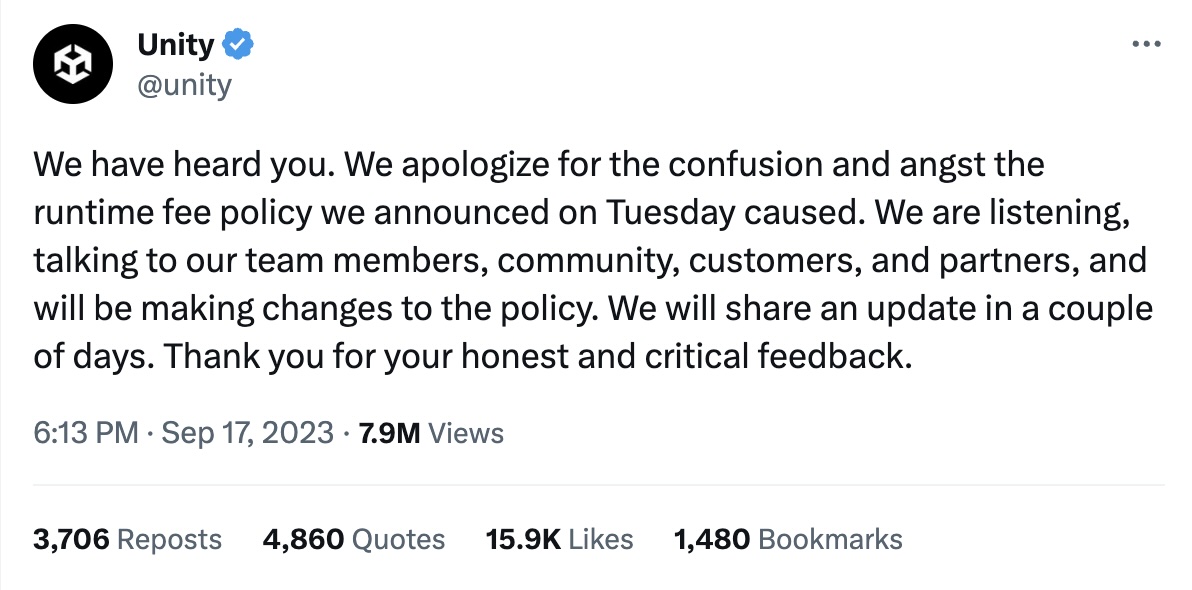As with everything tech, it starts with hype. Unity announced a new pricing model that charges the developer on a per-install basis for all Unity-powered games. Yes, that appears to mean that when a gamer installs the game, the developer is charged.
Unity, as a company, has been rattled. And we’ve even seen death threats seemingly as a result of the change. Some of our connections have been traumatized by some of these developments to the point of regisnation.
There are also allegations of insider trading by executives. It appears that some executives may have sold their stock before the annoucement went public.
But what is the impact of this pricing model in the longer term? As usual, it’s my goal to try and separate the hype of the moment from the impact it may have on game development in the future. Yes, this is a challenge.


Games in Development
For games already in devepment, the future depends on the maturity of the game and the confidence of the developer, but also the intended pricing model of the game itself. For freemium games, it can be difficult to forecast how much the user will ultimately pay for the gaming experience.
Future Games
For games that don’t yet exist, individual developers or studios may reconsider which engine is right for them in these future titles. Studios can do the math, but the install fee varies depending on success of the game and could affect planning and hiring adjustments.
Legacy Games
This is a tricky one because legacy game support is already spotty and I believe future developments will have an impact. Apple abandoned 32-bit support in iOS 10.3 (2017) and Intel has proposed dropping hardware support for 32-bit, too. For older PC titles, this could eventually soften the blow of the Unity annoucement.
The Unity annoucement has also resulted in some conspiratorial ideas. And while I usually don’t, we think some of these could be worth entertaining. Please humor us as we explore some of the more far-fetched possibilities. We want to use logic to justify each of these ideas. We’ll see whether they ultimately translate in reality.
Unity for Sale?
Recent annoucements, including Apple’s AR headset, and partnership have increased Unity’s stock price. If the company believes it could or should be acquired, this strategy makes a buyout more appealing. And if the executives are already sold out of the stock, they may be sufficiently decoupled from the negative consequences.
Unity Knows Better?
Crazy thought, but maybe Unity knows better than we do. We don’t have full knowledge of how often users (re)install games, so we’re all speculating about the actual cost to developers. What if Unity already has this data and has already factored it into the pricing model? What if Unity knows developers can ultimately afford to pay?
Unity Wants Growth?
What if Unity knows it needs to make this change for the sake of growth? Everyone in software is trying to switch or already has switched to subscription-based models. This type of revenue looks better in quarterly earnings and could ultimately reflect well in quartly earnings reports. This is basic for a publicly-traded company.
In the grand scheme, the video game space is already highly volitile. We know companies like Microsoft and Sony have bought games studios and many are struggling or have recently failed. But it’s important to acknowledge that companies like Apple with 15 or 30% fees have had a more profound impact on profits than this policy is likely to have, especially when it comes to games featuring microtransactions.
Does Unity’s pricing model threaten VR? Unity’s VR support has garnered praise from VR developers for the way it handles hardware. And Unity has been used to allow designers to build 3D spaces for immersive experiences. There are a number of factors that make VR weak in terms of value proposition.
Will this kill Unity? We predict a major shakeup of the c-suite, but it’s important to remember how this this type of annoucement is usually handled. You’ll hear negativity first and then we’ll find out later how this will actually affect gaming. It’s currently taboo to say anything positive or neutral about the policy and once people cool down, these companies can run the numbers and decide what to do for themselves.
As of writing, Unity’s web site claims it has strategic partnerships with Apple, Google, Magic Leap, Microsoft, Nintendo, Oculus, and Sony.
